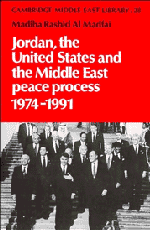Book contents
- Frontmatter
- Contents
- Foreword by William B. Quandt
- Acknowledgements
- Prologue
- 1 Introduction
- 2 Kissinger's legacy and imprint on the Middle East
- Part I Jordan in the Carter Middle East policy
- Part II Jordan in the Reagan Middle East policy
- 6 The evolution of Reagan's strategy
- 7 The US, Israel and Jordan: collaboration and discord
- 8 Two cases of collaboration and discord
- 9 The US and Jordan: how ‘much’ became ‘too much’
- Part III US, Jordan and Arab approaches to peace
- Appendices
- Notes
- Select bibliography
- Index
- Cambridge Middle East Library
6 - The evolution of Reagan's strategy
Published online by Cambridge University Press: 25 February 2010
- Frontmatter
- Contents
- Foreword by William B. Quandt
- Acknowledgements
- Prologue
- 1 Introduction
- 2 Kissinger's legacy and imprint on the Middle East
- Part I Jordan in the Carter Middle East policy
- Part II Jordan in the Reagan Middle East policy
- 6 The evolution of Reagan's strategy
- 7 The US, Israel and Jordan: collaboration and discord
- 8 Two cases of collaboration and discord
- 9 The US and Jordan: how ‘much’ became ‘too much’
- Part III US, Jordan and Arab approaches to peace
- Appendices
- Notes
- Select bibliography
- Index
- Cambridge Middle East Library
Summary
With every American election, there is a big bias towards one side [Israel]. At the same time, we find it necessary to deal with new friends, who most of the time do not realize what the problem is and its background, and who have to deal with many international problems. Because of this, they cannot give them the required time or interest … It can be a bitter experience … I have had the honour of serving my country and this region for over thirty years and I have seen this take place many times.
Such was King Hussain's summary of his long working relationship with US Presidents who have dealt, each in his own way and time, with Middle Eastern problems. Ronald Reagan proved to be no exception. As a presidential candidate he started to promote, in what might have been a vote-catching exercise, the view that ‘Israel is the only strategic asset in the area that the US can rely on.’ But in his first presidential press conference, he expressed what now seemed to be a conviction, that ‘Israel's combat-ready and even combat-experienced military is a force in the Middle East that actually is of benefit to us. If there was no Israel with that force, we'd have to supply that with our own. So, this isn't just altrusim on our part.’ Pressed at one point as to whether he had ‘any sympathy for the Palestinians’, his answer was a flat ‘no’, unlike his predecessor at the beginning of his term of office.
- Type
- Chapter
- Information
- Publisher: Cambridge University PressPrint publication year: 1993

